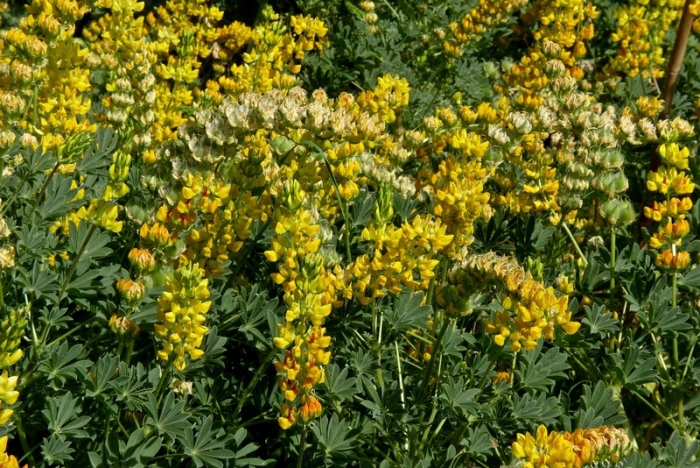Chick Lupine
(Lupinus microcarpus)
Chick Lupine (Lupinus microcarpus)
/
/

Jean Pawek
CC BY 3.0
Image By:
Jean Pawek
Recorded By:
Copyright:
CC BY 3.0
Copyright Notice:
Photo by: Jean Pawek | License Type: CC BY 3.0 | License URL: http://creativecommons.org/licenses/by/3.0/ | Attribution: 2015 Jean Pawek | Publisher: Calphotos |


























































Estimated Native Range
Summary
Lupinus microcarpus, commonly known as Chick Lupine, is an annual herb that is native to open grasslands, chaparral, and open woodlands in Western South America, as well as Oregon and California. It typically grows to about 80 centimeters (31 inches) tall. The foliage consists of palmately compound leaves with 5-11 leaflets, each leaflet being 1-5 centimeters (0.39-2.0 inches) long and up to 1 centimeter (0.39 inches) broad. The flowers of Chick Lupine are showy and range in color from pink to purple, with variations that can include white and yellow. They are produced in open whorls on an erect spike, and the flowering season is in the spring.
Chick Lupine is valued for its vibrant flowers which can add color to wildflower meadows and informal garden settings. It is often used for restoration projects and as a cover crop due to its ability to fix nitrogen in the soil, which improves soil fertility. In cultivation, it requires full sun exposure and can tolerate low water conditions, making it suitable for xeriscaping. It thrives in soils with medium drainage and is generally low maintenance. However, it can be susceptible to fungal diseases, especially in humid conditions. Chick Lupine is not typically associated with aggressive roots or invasiveness, but in some regions, it can self-seed prolifically if conditions are favorable.CC BY-SA 4.0
Chick Lupine is valued for its vibrant flowers which can add color to wildflower meadows and informal garden settings. It is often used for restoration projects and as a cover crop due to its ability to fix nitrogen in the soil, which improves soil fertility. In cultivation, it requires full sun exposure and can tolerate low water conditions, making it suitable for xeriscaping. It thrives in soils with medium drainage and is generally low maintenance. However, it can be susceptible to fungal diseases, especially in humid conditions. Chick Lupine is not typically associated with aggressive roots or invasiveness, but in some regions, it can self-seed prolifically if conditions are favorable.CC BY-SA 4.0
Plant Description
- Plant Type: Herb
- Height: 0.5-1 feet
- Width: 0.5-1 feet
- Growth Rate: Rapid
- Flower Color: Pink, Purple, White, Yellow
- Flowering Season: Spring
- Leaf Retention:
Growth Requirements
- Sun: Full Sun
- Water: Low
- Drainage: Medium
Common Uses
Bee Garden, Bird Garden, Butterfly Garden, Deer Resistant, Drought Tolerant, Groundcover, Hummingbird Garden, Low Maintenance, Rabbit Resistant, Showy Flowers
Natural Habitat
Native to open grasslands, chaparral, and open woodlands in Western South America, Oregon, and California
Other Names
Common Names: Wide-Bannered Lupine , Lupin À Petites Gousses
Scientific Names: Lupinus microcarpus , Lupinus affinis , Lupinus fischeranus , Lupinus verticillatus , Lupinus densiflorus var. barbatissimus , Lupinus densiflorus var. austrocollinus , Lupinus fischerianus , Lupinus subvexus var. wilkesii , Lupinus comberanus , Lupinus comberianus
GBIF Accepted Name: Lupinus microcarpus Sims